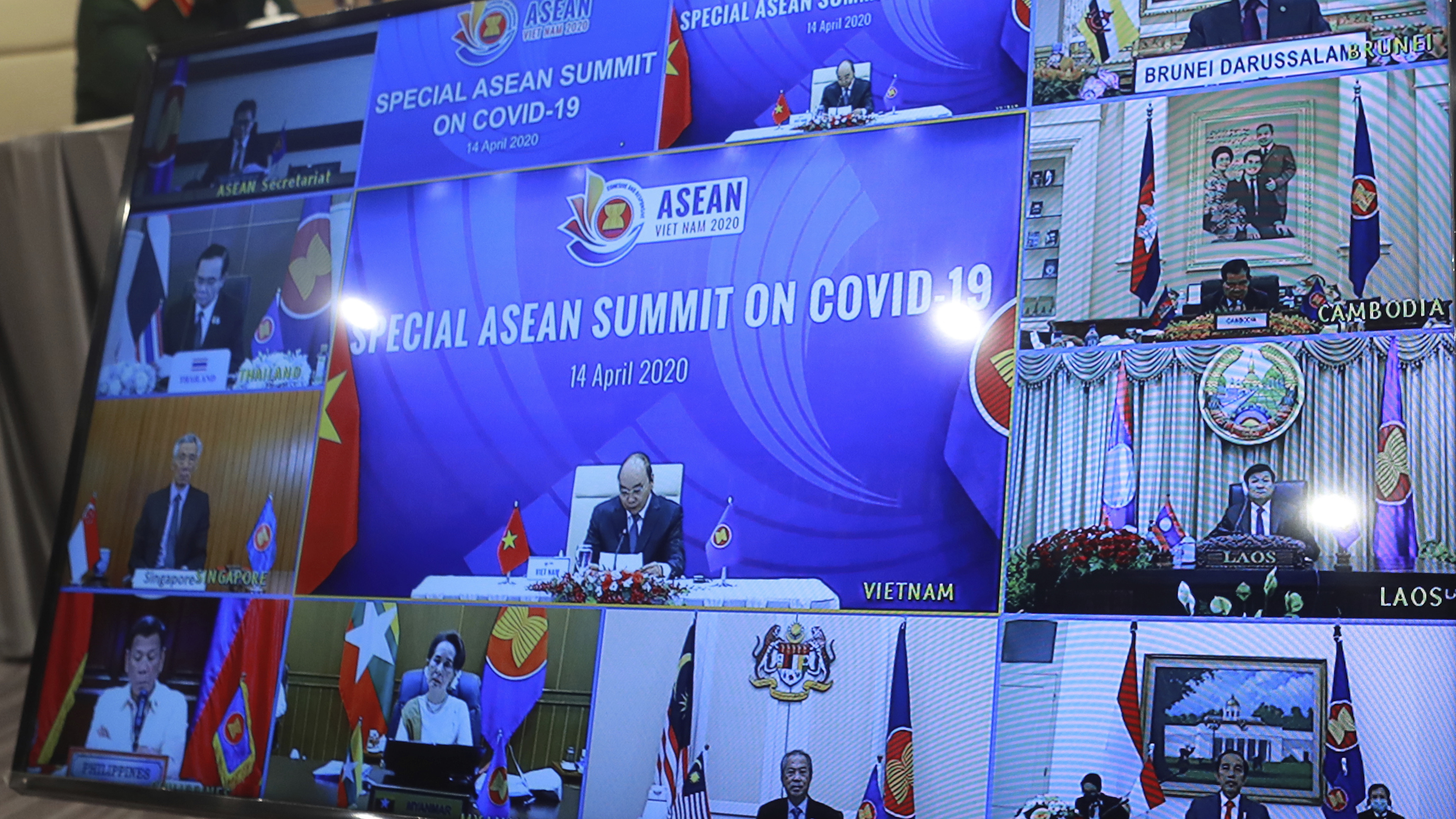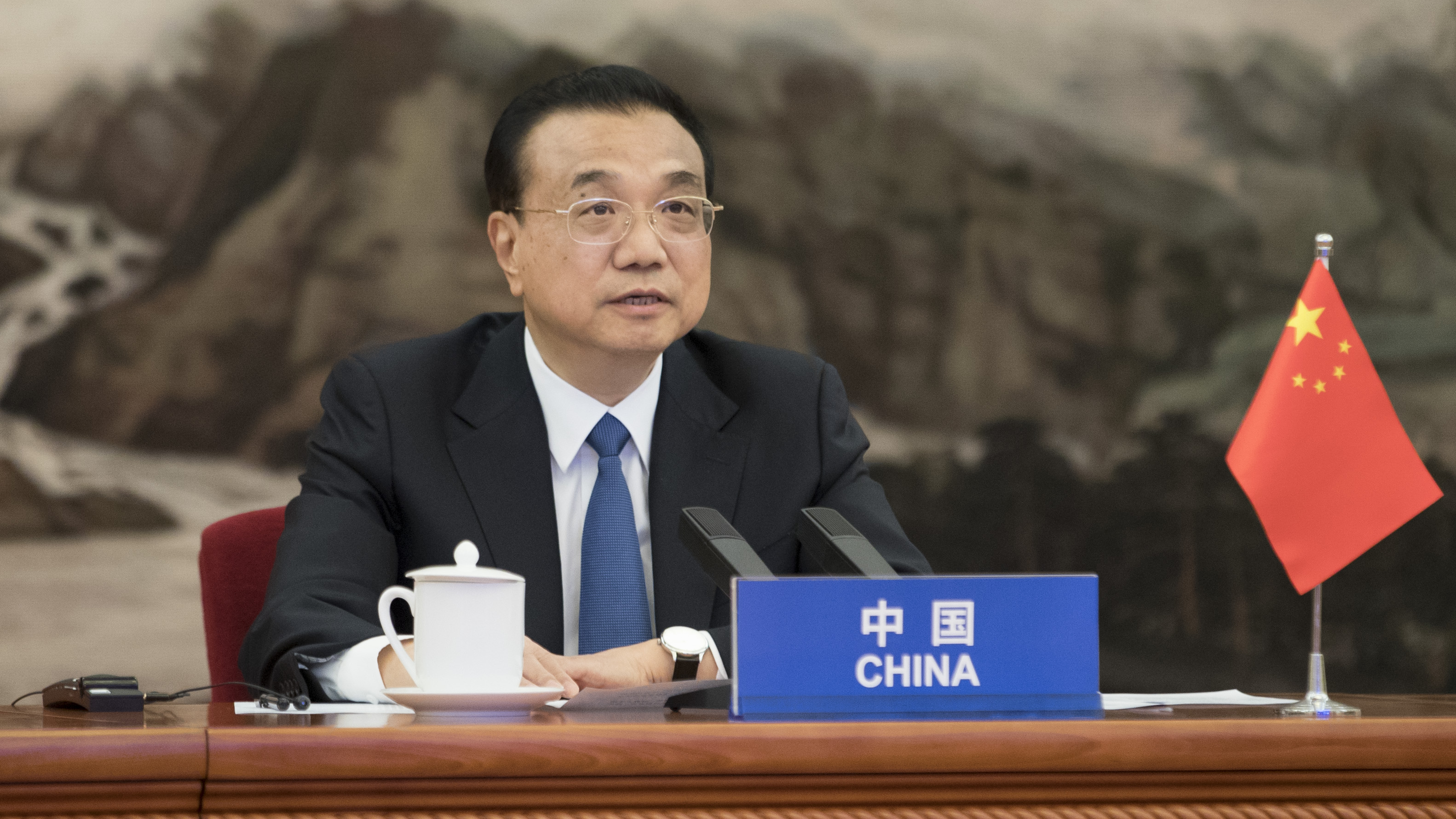
ASEAN leaders and their counterparts from China, Japan and South Korea hold the summit online to discuss actions coping with the COVID-19 pandemic, April 14, 2020. /AP
ASEAN leaders and their counterparts from China, Japan and South Korea hold the summit online to discuss actions coping with the COVID-19 pandemic, April 14, 2020. /AP
Editor's note: Ji Xianbai is an associate fellow of the EU Centre in Singapore, Nanyang Technological University, Singapore. He holds a doctorate in International Political Economy. The article reflects the author's opinions, and not necessarily the views of CGTN.
Leaders and top officials from the Association of Southeast Asian Nations (ASEAN) and ASEAN+3 countries held a virtual meeting on April 14, discussing the latest development on the COVID-19 pandemic.
This summit was in a sense of a follow-up event to the special emergency ministerial session between China and ASEAN countries on February 20, where foreign ministers pledged to make common courses to stem the spread of the virus beyond China into Southeast Asia.
The latest impetus now, however, is to come up with coordinated regional responses to reverse the tide of COVID-19 within ASEAN itself. After all, the coronavirus infection has reportedly hit more than 20,000 people and taken some 850 lives in Southeast Asia alone – at a time when China is gradually lifting its internal travel controls and slowly getting the economy back on its feet.
At the meeting, the sentiment that no single country is safe until the regional community as a whole is safe was front and center, arguably setting the tone of the whole event.
Leaders, besides sharing with each other's respective national campaigns to combat the pandemic - like Singapore's "Trace Together" mobile phone app and Malaysia's "Movement Control Oder" - especially stressed the importance of timely information sharing and maintaining open trading routes not least for live-saving necessities including food and medical products.
In particular, the Singaporean Prime Minister Lee Hsien Loong suggested ASEAN to formulate a set of rules-based common criteria and guidelines on when to impose travel and trade restrictions and under which conditions such restrictions on goods and human movement can be relaxed in a regionally consensual manner.
The leaders also rightly looked beyond the current public health catastrophe to ponder upon ways of building and enhancing regional resilience once the COVID-19 pandemic subsides.
In terms of economics, leaders called for the preservation of key cross-border supply chains for fast-tracking post-coronavirus economic recovery. In terms of public health, an important outcome that emerged in the lead up to the Summit was the agreement to set up a COVID-19 ASEAN Response Fund, proposed by Thailand as a regional mutual help mechanism.
The Fund will be used to build up ASEAN common reserves of essential medical supplies and support joint research on treatment and vaccination. Ideally, such Fund as the Philippines sees it should be equipped with public health surveillance capabilities and an early-warning mandate, proactively detecting future epidemics and supporting collective decision-making.
The spirit of ASEAN standing resolutely in unity and the concreteness of policy proposals floated at the emergency Summit show that 10 member states of ASEAN, together with three Asian neighbors, are serious in mounting united responses and remedial measures to the pressing COVID-19 pandemic and indeed to all future episodes of public health emergencies and other types of disasters, natural or man-made.
China should take a lead in this regard, shouldering responsibilities in collaboration with ASEAN partners. This is certain because China has been developing the so-called "Health Silk Road" (HSR) under the ambitious Belt and Road Initiative framework since 2016.

Chinese Premier Li Keqiang attends a special summit of the Association of Southeast Asian Nations, China, Japan and the Republic of Korea (ASEAN Plus Three countries or 10+3) on COVID-19 via video link in Beijing, April 14, 2020. /Xinhua
Chinese Premier Li Keqiang attends a special summit of the Association of Southeast Asian Nations, China, Japan and the Republic of Korea (ASEAN Plus Three countries or 10+3) on COVID-19 via video link in Beijing, April 14, 2020. /Xinhua
ASEAN countries are notably among the major beneficiaries of the HSR as China has dispatched public health experts to Southeast Asia to improve local health systems and ophthalmology teams to Cambodia, Myanmar and Laos through the "Brightness Action" program.
At the height of the COVID-19 pandemic, China has also been generously supplying badly needed surgical masks, ventilators, personal protective suits and other healthcare items to and sharing experiences with close to 100 countries from across Afro-Eurasian and Latin American continents.
More importantly, as it champions the concept of connectivity, China has the moral obligation to deal with all kinds of unintended consequences and negative externalities associated with improved connectivity and connections.
The ongoing COVID-19 pandemic proves that globalization is a double-edged sword. It is without question an enabler of economic prosperity, poverty elimination and inter-connected development - while also playing a contributory role in the diffusion, if not spread, of infectious disease, terrorist ideologies, and xenophobic hatred on a scale never seen before.
At the turn of the 21st century, China took advantage of the Asian Financial Crisis of 1997-98 to establish itself as a responsible stakeholder and leader in East Asian economic affairs.
Some twenty years later, another strategic opportunity has emerged on the back of the COVID-19 pandemic for China to claim a decisive leadership role in the sociocultural aspect of East Asian international relations, or the sociocultural pillar of Chinese President Xi Jinping's conceptualization of an "Asian Community of Common Destiny". China should seize the day, carpe diem!
(If you want to contribute and have specific expertise, please contact us at opinions@cgtn.com.)